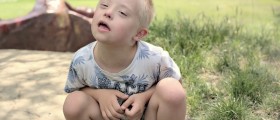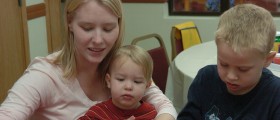
People with Down syndrome are born with an extra copy of chromosome 21 — which is why the condition is also called Trisomy 21. While every person with Down syndrome is different, it is common for people with the condition to suffer from a variety of physical health conditions, such as congenital heart conditions, skeletal issues, and intestinal issues. Intellectual disability is also expected.
Apart from these more well-known characteristics of Down syndrome, people with the condition may face various social issues which can make their life harder, too. The social stigma of having Down syndrome itself is one of these difficulties.
In addition, numerous behavioral patterns common to people who have Down syndrome differ those of typically-developing individuals, potentially leading to social problems. Either way, if you desire to learn more about this interesting issue, read on.
Social Development and Down Syndrome
Social development involves the acquisition and improvement of the interpersonal skills needed in friendships and relationships — playing and leisure skills as well as self-help skills and socially acceptable behavior, for instance.
Social development relates to skills we need to interact with other people and society, at its most basic — so of course, social development requires other people to be present in one's life.
Successful social interactors pick up on many of the conscious and subconscious signals that people around them emit during social interactions. People pay attention to visible, non-verbal clues such as body language, gestures, facial expressions, and posture, along with verbal ones signals as words, sentences, intonation, and so on.
People with Down syndrome are usually good at communicating with other people and understanding them. Nevertheless, children with Down syndrome are bound to face problems in some aspects of public and private life, predominantly in situations related to school and sports — really, just like any other child in a way, since all children are still learning social skills.
It is difficult to diagnose the level of intelligence present in a child with Down syndrome at a very young age. However, timely therapy and medical support can improve the lifestyles of people with Down syndrome significantly.
People with Down syndrome are usually communicative, curious about life, and very social, constantly desiring to see new places and meet new people. Thus, usually, treating such a child as you would any typically-developing child is the best possible step to take.
Down Syndrome: Possible Behavioral Problems
All children are influenced by the behavior of the people around them, especially their parents, and this is no exception when it comes to children with Down syndrome. These children need to be loved, feel secure, have food, warmth and adequate care too, just as any other child.
However, in some situations, parents may not be capable of taking good care of their children with Down syndrome. Yet, parents need to adapt to this sort of parenting since, through this process, they will help both themselves and their children greatly.
Even though it might be hard to parent a child with Down syndrome, there are many services you can turn to for support and assistance such as support groups, medical experts, health facilities, and even respite care.
For children with Down syndrome, social understanding is usually a strength, beginning in infancy because many of the cues which indicate how someone is feeling are non-verbal, so they are very capable of contemplating the main message even if they don't understand the language that is spoken. The non-verbal messages people are exposed to every day include many different aspects, like tone of voice, facial expression and body posture.
On the contrary, children with Down syndrome even tend to have a better social understanding and social behavior than other children with similar levels of cognitive and communication delay. This helps children with Down syndrome to be successful in community activities and in inclusive education.
All parents have expectations when it comes to raising their child. These expectations may sometimes be too high when it comes to a child with Down syndrome, and expecting different things from your child than your child can comfortably attain can be counter-productive in parenting.
Surely, it may seem easier to treat the child with Down syndrome as if he/she is younger than he/she actually is but this is not a good step to take — instead, presume competence, but look to "scaffold" challenges you come across. This might be a hard step to take in parenting since you may have a tendency to be overprotective, but you are advised to stay supportive and patient, especially when it comes to your child's cognitive skills which may take more time do develop than normally.
Another important thing to note is that children with Down syndrome are likely to get very attached to routines and set patterns of life. Therefore, all activities that the parents plan out may have to be oriented to familiar surroundings. Teachers and other caretakers should be involved in the process of helping a child with Down syndrome, contributing through teaching him/her important life skills. The reward and positive reinforcement are recommended in any cases of the kind of proper behavior you would like to see more of.Still, parenting of taking care of children with Down syndrome is not always easy. One challenge you may come across is that people with Down syndrome can be very persistent, and you may need heaps of patience and tolerance to set boundaries in a healthy but firm way.
Moreover, these children may often be prone to running away, making noise or attracting attention through other methods.
Thus, all these factors need to be taken into consideration during the process of raising of a child with Down syndrome. Rearing a child with Down syndrome is certainly not an impossible task. On the contrary, with adequate support and a good parental plan, a child with Down syndrome can learn how to deal with many of life's challenges and thrive.To sum up, Down syndrome is a congenital condition manifesting through the presence of an extra copy of the chromosome 21. Therefore, this condition is commonly referred to as Trisomy 21. It manifests through numerous health problems which are both physical and mental, appearing through symptoms considered to be typical for this condition. Being a parent or a caretaker of a child with Down syndrome may be a hard task in some situations while, in others, it is bound to be a pleasure and a wonderful experience.

















Your thoughts on this
Loading...